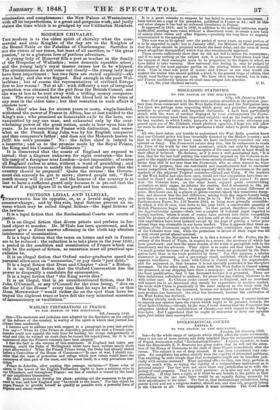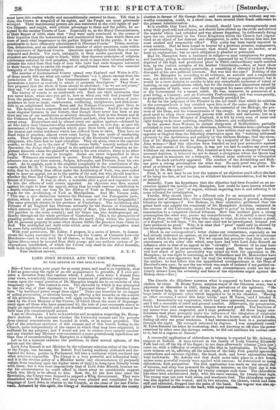ECCLESIASTICAL COURTS. Lerma L
TO THE EDITOR OF THE SPECTATOR.
London, 5th January 1848. Six—In the whole range of subjects which vitally affect the entire community, there is not one of more serious and daily mischief than the antiquated remnants of Popish domination called " Ecclesiastical Courts." I rejoice, therefore, to learn that the Honourable E. P. Bonverie has given notice that he will call the atten- tion of the House of Commons to the state of those Courts immediately after the recess. The subject is one of deep interest. It has been considered very com- plex. Its complexity has arisen entirely from the cupidity of interested partisans. Can anything be more simple than that ecclesiastics ought not to interfere judi- cially with secular matters? What spiritual office do they, can they, perform in proving men's wills, or trying the validity of a testamentary instrument as to personal estate? The law does not allow them auy jurisdiction as to wills dis- posing of real property. That is a civil question: so is also any suit relating to personalty. If they have a right, or if there be any benefit to the public in their interference in the one case, there would be an equally fitting necessity for their adjudication in the other. The fact is, that testamentary jurisdiction, -being purely a civil and not a religious matter, should not, and does not, properly belong to the Church at all. This usurpation it mast surrender. The Civil Courts must have this matter wholly and unconditionally restored to them. Till that is done, the Crown is despoiled of its rights, and the People are most grievously wronged. Their matrimonial powers are also restricted to the civil rights of par- ties htigant; and might, with infinite advantage to them and the public, be as- signed to the secular Courts of Law. Especially so, as the Royal Commissioners, in their Report of 1830, state that "they were early convinced in the course of their inquiries that the testamentary and matrimonial laws, than which there are none of such vital importance to the parties litigant and to the public, it is im- practicable to have efficiently administered in Diocesan Courts."Tithes, mortua- ries, defamation, and an aimed incredible number of other questions, come within the cognizance of Spiritual Courts. Questions upon religions faith they of course expound and decide. Yet such, unhappily, is their modus operandi, that by- standers are frequently made to blush, when they discover principles of religious intolerance enforced by civil penalties, which seem to have been invented rather to alienate the mind from that body of men who have had such weapons intrusted in their hands than to excite the respect of enlightened reason for the essential benignity of the Christian religion. The number of Ecclesiastical Courts spread over England and Wales is 372: of these nearly 800 are what are called " Peculiars "—ij e. places exempt from the jurisdiction of the Bishop. The Commissioners say, "there are some of so anomalous a nature as scarcely to admit of accurate description." They there- fore proposed that the whole of them should be abolished; "as we are not aware," they say, of any one benefit which would result from their continuance." The variety of courts is an intolerable evil. Such are their intricacies that you never know, when once you get in how or when you will find yourself free from the perplexing mazes. Never Ills contrivance rendered a system of juris- prudence at once so inapt, cumbersome, conflicting, unrighteous, and dishonour- able to an enlightened nation. Rome and the Norman Conqueror gave them to us. The design was to supersede and crash Saxon liberties. And it is one of the most singular features in our history, that though there never has been at any time any one of our institutions so severely denounced, both in the Senate and at the Common Law bar, as Ecclesiastical Courts and laws, they have never yet been swept away. Everywhere and by almost every one spoken against—shunned by all who know their character—they nevertheless remain to this day, at once the monument of the bygone corruption which gave them birth, and the evidence of the mental and moral indolence which has suffered them to exist. They have no fixed rules of practice; almost every court having its own mode of conducting suits. Their Judges are (with the exception of the Provincial Courts) nearly all clergymen, who have had no legal education. They sit alone, even in the superior courts; so that if, as in the case of " Geils versus Geils," recently noticed in the Spectator, the Judge shall be placed in the awkward situation of hearing an im- portant domestic cause the plaintiff in which is his own relative, there is no other judge before whom it can be brought. Juries are never impanelled in these courts. Witnesses are examined in secret. Every Bishop appoints, and at his 1 pleasure can at any time remove, Judges, Advocates, and Proctors, from his own court. As to appeals, such is the singular complexity in the constitution of the courts, that Mr. G. V. Vernon, in his examination before the Commissioners, ad- mits, that he, holding four offices under the Archbishop of York, was once called upon to hear an appeal, not as to the merits of the suit, but who should hear it— whether the Dean and Chapter of York, or the Commissary of Richmond in the diocese of Chester. It was, in short, a scramble after a good and expensive suit. To him the officers of both courts appealed. An objection was then started against his right to hear the appeal, seeing thet he could exercise jurisdiction in a double relation—at one time for the Bishop of York as Diocesan, and after- wards for the Archbishop of York as Metropolitan. And Mr. Vernon adds, "This was a nice distinction between the Diocesan and the Prerogative juris- diction, which I am aware must have been a source of frequent irregularity." The same principle obtains in the province of Canterbury. The Archbishop and Primate of all England has Diocesan authority, for the diocese of Canterbury, which extends over 52 parishes in the county of Kent, (the Archdeacon having 218 parishes in the same county); and his Grace has also Archiepiscopal au- thority throughout the whole province of Canterbury. This is the prerogative of granting probate and administration when the party dying within the province
' left 51. personal property in some other diocese within the province than where he died. The multiplied and daily evils which arise out of this prerogative must be more fully exhibited hereafter.
, With your permission, Mr. Editor, I propose, in a series of letters, to demon- strate the injury sustained by the Crown—by the Courts of Common Law—by Merchants—and in very deed by all classes, so long as these Courts exist. Re-
' ligions liberty must be rescued from their grasp; and one uniform system of ju- risprudence established, of which the Crown only shall be the direct fountain, both in its legislative and executive forms.



























 Previous page
Previous page